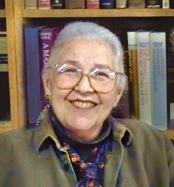 As a woman in her late 70s, a mother, widow and former businesswoman, I know that the subject of aging torments women all over the world, as it did me. And I am so glad to say that the study of Aesthetic Realism, the education founded by Eli Siegel, ended this torment in me and it can for everyone.
As a woman in her late 70s, a mother, widow and former businesswoman, I know that the subject of aging torments women all over the world, as it did me. And I am so glad to say that the study of Aesthetic Realism, the education founded by Eli Siegel, ended this torment in me and it can for everyone.
I often asked myself: “Will I age gracefully?” My husband, Conrad, told me many times that I was preoccupied with my looks. Every other week I asked him whether I should dye my hair. Almost every time we went out with other couples, I was driven to ask him on our way home: “Who looks older—Grace or me?” I didn’t feel proud of this but I couldn’t stop. I felt what many women do, that so much of my power depended on how I appeared, and I was terrified of losing that. I began to see this differently when, at the age of fifty, I learned in my first Aesthetic Realism consultation that my deepest desire, and that of every person, is to like the whole world, see meaning in people and things. And I learned too, the thing in every person that is against life is contempt, which Eli Siegel defined as “the false importance or glory from the lessening of things not [one]self.”
In The Right of Aesthetic Realism to Be Known, Ellen Reiss writes:
Aesthetic Realism shows a person that the only thing which can have her think well of herself—whether she is twenty or fifty or eighty-five—is to see the world as something to value, be just to, know. A person’s like of herself always depends completely on whether she is trying to like and respect the outside world.
In the classes I had the honor to attend with Eli Siegel and continue now with Ellen Reiss, my mind is engaged in the study of the whole world, learning to be fair to literature, current events, science, the questions of people, including my own. In a class early in my study, Mr. Siegel so kindly comprehended me as he spoke to me about how I saw truth, my marriage, my children, and he asked me with such delicacy, “Are you worried about age? Stupidly, I tried vehemently to deny it but I am grateful he wasn’t fooled by me for a minute. He saw a sad look on my face that showed I was deeply troubled and he wanted to encourage me to like my thoughts on the subject. “That’s fine”, he said humorously, “we need people who grow younger by leaps and bounds! Do you think you’re bashful on the subject? Do you think that women in Hollywood, for example, are aware of the years?”
And Mr. Siegel asked me this crucial question: “Are you trying to make, without knowing it, as little of things as possible?” This was so true about me. I thought I was a smart cookie and nothing in the world was good enough to excite me. I shrugged things off and put a damper on people’s enthusiasm.
I was learning that my pain didn’t come from getting older, but because I had contempt for the world. Mr. Siegel explained: “Aesthetic Realism says if you don’t do all you can to like the world you’re not smart with yourself,” and he asked me, “Do you believe you’re doing all you can to like the world?” “No, I’m not” I answered. And he continued, “Do you think the wheels are running down? Do you have what is called very often, world weariness, which is a very frequent thing?” And he said with such good will: “Would you like to see something of a new world?”
I will be grateful for the rest of my life that Eli Siegel criticized my desire to have contempt, to be weary of the world, which is such a strong tendency in people as they get older. Because of this I no longer feel desperate about my age. Instead of giving in to it, I am a critic of my desire to be disappointed. As I talk to people I am interested in who they are, what they truly deserve, and I feel hopeful about the future.
In an historic document, “A Declaration About Old Age,” Mr. Siegel explains the importance of an assignment, now given to every person having Aesthetic Realism consultations:
Aesthetic Realism would like to have every person feel that it was a glorious, splendid obligation to put down as clearly as possible: “I liked the following today”—with description; “It wasn’t me, but I liked it!”—and say it in writing as well as they can—…it will do something against the quite clear and usually victorious terrors of age.
As I write each day about something that I like—a dark gray evening sky with streaks of light, bright red tulips in a vase, a novel by George Sand—ordinary, everyday things take on new meaning and wonder. I love the following words from “A Declaration About Old Age.” They can give hope to every person:
The greatest statement that could be made to a person aged in any way is: “The world is as fresh as ever it was, and therefore your perception of it can be as fresh as any perception you ever had.” To see something honestly is to be born in relation to an object. All honesty is birth.

